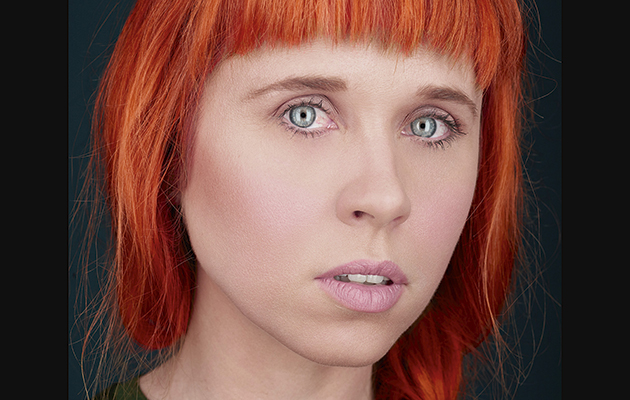Both fascinated and troubled by humankind’s increasingly intimate relationship with technology, Holly Herndon makes electronic music whose dense conceptual, theoretical and political elements are often eclipsed by their sheer ravishing beauty. Mixing the hard-cut collage methods of musique concre...
Both fascinated and troubled by humankind’s increasingly intimate relationship with technology, Holly Herndon makes electronic music whose dense conceptual, theoretical and political elements are often eclipsed by their sheer ravishing beauty. Mixing the hard-cut collage methods of musique concrete with sound-warping software and customised digital instruments, Herndon’s second album is not ashamed to embrace blissful melody and trance-like euphoria, yet remains constantly alive to the liberating power of dissonance and disruption. There is a great disturbance in the Force.
Born and raised in Tennessee but now based in San Francisco, Herndon’s track record to date includes performing in Berlin techno clubs, studying under legendary avant-rock guitarist Fred Frith, and composing ambient audioscapes tailored to the acoustics of car interiors. Currently working on her doctoral thesis at the Centre for Computer Research in Music and Acoustics at California’s Stanford University, her work has always balanced academic and populist, cerebral and sensual, Apollonian and Dionysian. But Platform is her most successful fusion of these elements so far, an ambitious album that propels Herndon into the avant-pop premier league alongside the likes of Bjork, Aphex Twin, Matthew Herbert and Flying Lotus.
Academic theory is one of the forces shaping Platform, an album Herndon describes as a “paradisic gesture”, a bold appeal for electronic music to play a bigger role in forging optimistic, politically progressive new narratives to counter those of hegemonic right-wing elites. She quotes economics professor Guy Standing, who is credited with coining the modish term “precariat”, and cultural theorist Suhail Malik as influences on the album. But none of this is essential to enjoying Platform. No background reading is necessary, no apprenticeship on the arid avant-garde fringes. Just dive in and savour the lush sonic foliage.
Platform is awash with squelches clonks and loops, but the most immediately arresting feature is its variety of human voices. Herndon treats her own vocals and those of her multiple collaborators with equal irreverence: processed, stretched and desiccated, liberated from linguistic duty but never from emotional force. Drag performer Colin Self is spliced into gleaming shards on “Unequal”, while soprano singer Amanda DeBoer Bartlett provides staccato trilling and heavy breathing over the deconstructed whoosh and shudder of “DAO”.
There are some simply gorgeous vocalese collages here, including “Home”, a “breakup song” about communication devices revealed as unfaithful lovers by post-Snowden surveillance anxiety, or “New Ways To Love”, with its synthetic swirls of Liz Fraser-ish voluptuousness. An exploded cubist choir ripples over a sleek electro pulse on “Chorus”, which samples the sounds of Herndon’s online browsing habits, while sublimely intertwined sighs and sobs yoke together the skeletal rhythmic framework of “Home”. Occasionally, Herndon even allows herself a conventional vocal performance, notably on “Morning Sun”, which sounds like a big-haired 1980s power ballad refracted through a cracked mirror of post-glitch sonics and post-dubstep percussion.
Striking a darkly satirical note, the spoken-word monologue “Lonely At The Top” is the most incongruous digression here. It is voiced in menacingly soft tones by Claire Tolan, a Berlin-based artist and radio host who works in the niche field of Autonomous Sensory Meridian Response (ASMR), a quasi-fetishist subculture in which people experience a heightened tingling response to various sensory stimuli. Over a drifting bed of clammy sound effects, Tolan plays the role of a hostess administering some kind of non-specific pampering treatment to an important client, probably male, certainly wealthy and entitled. Reminiscent of Chris Morris’s cult “ambient radio” show Blue Jam, this boldly bizarre vignette is fifty shades of creepy.
Laptop electronica has now been around long enough to establish its own pantheon, its own hierarchies and its own lazy orthodoxies. In person and on record, Herndon has plenty to say about how too much digital music has become complacent and retrograde. latform is not a manifesto, but it feels like a galvanising challenge to Herndon’s peers to embolden their ideas, broaden their horizons and push on into an undiscovered continent of sound.
Q&A
Holly Herndon
You make left-field pop albums while studying for a doctoral thesis in experimental music, do you see these activities as separate or connected?
I was trying to separate them at the beginning, but not anymore. On the first record they definitely separated more track by track, but on this record I definitely tried to combine the things that I love. Platform is more pop and more experimental. I think it’s both.”
You have called Platform a “paradisic gesture”, can you explain that?
There’s a professor of economics based in London named Guy Standing, he talks about Paradise Politics and creating new fantasies. When the shit hits the fan with the economy, the right is very good at creating Paradise Politics for people to easily fall into, and the left sometimes fails at creating an alternative. That was the thought behind it: how can we come together collectively to create new realities?
So you think electronic musicians should have more political responsibility?
I don’t like being absolute and saying this is what everyone needs to be doing, I just really like the idea of music mattering. Recently experimental music has been invited to more mainstream stages, especially through dance music, but what comes with that? Do we just have the experimental hour and then we have the dance party, and that’s all that changed? Or are we also able to port over some of the values and ideas form that community? That would be the ideal.
INTERVIEW: STEPHEN DALTON



